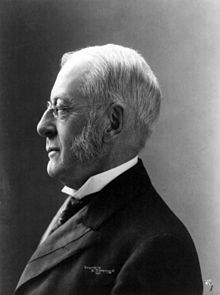
OK, listen. (That’s a weird thing to say to someone who is READING a passage, but bear with me, please!) I hate pompous attitudes. Especially when they are held by people who had only the great good fortune of being born into a well-off family.
I can only be talking about Charles Eliot, President of Harvard from 1869 to 1909. (Were you thinking of someone else?)
I know that he and John Dewey had a friendly rivalry, whereupon Dr. Eilot claimed all manner of credit and adulation for several components of formal education. And Dewey claimed that the “western schools” (he meant Michigan, Minnesota, etc., because 1900s…) had contributed just as many good things. Ok, Harvard first:
The first is the elective system (some courses that are not required for the completion of the degree may be taken to satisfy learner curiosity, for example).
The second is the idea that “increase of power is to be aimed at, rather than acquisition of knowledge.”
The third is individualization of instruction (e.g. labs, recitations, seminars) and other methods where the instructor must give personal attention to the student.
(items adapted from Dewey’s Early Works vol 3, pg. 198 - The Angle of Reflection)
And of course, Dewey included his own ideas of how western schools had contributed, to parallel Eliot’s:
-
First and foremost, there is the conception of the democratic idea in higher education (Education is for everyone).
-
The conception that the University is only the culmination of the common school education belongs to the West
-
Third, the earnest and systematic attempt to make an organic connection between the University and the preparatory schools is the affair of the West.
And this quote:
“It is the easy and natural outcome of the democratic idea in education; the idea that higher education, as well as the three R’s, is of and for the people, and not for some cultivated classes.”
(items adapted from Dewey’s Early Works, vol 3, pp. 199-200 - The Angle of Reflection)
It is with this playful back-and-forth mental state that I came across this dedication from The Harvard Classics or The five-foot shelf of books (1909-1910):
How Dr. Eliot Solved Your Reading Problem
DR. CHARLES W. ELIOT for forty years President of Harvard University, acclaimed without question America’s greatest scholar and educator, was eminently fitted to select out of the world’s literature, a well-rounded library of liberal education — depicting the progress of man observing, recording, inventing, and imagining from the earliest historical times to the present day.
Never before had a task of this magnitude been undertaken by an educator of the standing of Dr. Eliot. Never before had a question of such unusual public importance received the time and attention that has been applied to the selection of the contents of the Harvard Classics."
I’m sure he was very smart, but come on, man… Get over yourself. What, there’s more?
“As has been suggested before, the purpose of The Harvard Classics is different from that of many collections which aim to select the hundred or fifty best books in the world. It is, to quote Dr. Eliot;, “nothing less than the purpose to present so ample and characteristic a record of the stream of the world’s thought that the observant reader’s mind shall be enriched, refined, and fertilized by it.” (Collier’s Editorial Bulletin, Saturday April 16, 1910. p. unk; babel.hathitrust.org/cgi/pt)